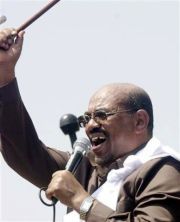Sudan’s Beshir: soldier turned Islamist turned peacemaker
KHARTOUM, July 7 (AFP) — Sudan’s President Omar al-Beshir is preparing to share power with former foes in the south he relentlessly fought until a January peace deal, as two other rebellions continue to tarnish his rule.

|
|
Sudanese President Omar Al-Bashir addresses a crowd in Juba, Sudan Monday Jan. 10, 2004. (AP). |
“I will deal with him soldier to soldier,” Beshir, said shortly after seizing power in a military coup in 1989, in reference to southern former chief rebel John Garang, leader of the Sudan People’s Liberation Movement (SPLM).
But six months after their 21-year-long conflict ended with 1.5 million people dead, Field Marshal Beshir and Colonel Garang are about to lead Sudan during at least four years of the six-year interim period in line with the January 9, 2005 agreement.
Beshir will stay on as president and Garang will become vice president on Saturday, until general polls are held four years later.
In 2011, Sudan’s oil-rich, animist and Christian south will be asked to vote in a referendum on whether it wants to secede from the predominantly Arab and Muslim north.
“We are very optimistic 2005 will be a year of peace,” Beshir said in June, after attending the signing of a reconciliation agreement between his government and Sudan’s largest opposition bloc, the National Democratic Alliance, that ended a 16-year feud.
In a series of conciliatory moves, Beshir went on to announce in a June 30 address that he would lift the 16-year-old state of emergency in northern and southern Sudan starting July 9.
He also freed Islamist leader Hassan al-Turabi, his mentor turned arch-rival and once the chief ideologue of the regime.
Beshir also promised to free all other political prisoners.
But Turabi celebrated his first day of freedom by criticizing the new interim constitution that sets quotas for political representation, when “this should be left to the people to determine”, and by attacking the government’s record on civil liberties.
Observers have argued that the regime needs to rally the opposition and operate a smooth transition to pull the rug out from under remaining rebel groups still fighting against Khartoum.
An uprising by ethnic minority rebels in Sudan’s western region of Darfur has shown no sign of letup despite a bloody crackdown by government-backed militias and cost Beshir much bad press internationally.
Fighting since February 2003 has left 300,000 people dead, mostly civilians, and 2.4 million displaced. Humanitarian groups on the ground and a UN investigation team have reported frequent rapes, killings and wanton destruction.
The International Criminal Court said it has enough evidence to try 51 alleged perpetrators of war crimes in Darfur — among them several officials of Beshir’s regime whom the president has vowed not to hand over.
African Union-sponsored talks between Darfur rebels and Khartoum have made little progress.
Another rebellion has flared in eastern Sudan where armed tribes and opposition movements have long complained of marginalization.
Born in 1944 into a rural family in Hoshe Bannaga, some 100 kilometers (62 miles) north of Khartoum, Beshir had a fascination with the military at an early stage.
In 1988, at the height of the civil war between the Khartoum government and rebels of the SPLM, he was appointed commander of the eighth brigade, stationed in the south at the time.
The posting brought him face-to-face with the conflict and came at a time when there was great dissatisfaction in the military, particularly the officer corps, with the government of then prime minister Sadiq al-Mahdi.
A year later, Beshir, backed by the National Islamic Front party of Turabi, toppled Mahdi’s three-year-old democratically-elected government in a bloodless coup.
He declared a nationwide state of emergency, suspended the constitution, dismissed parliament and disbanded all political parties, branding then “sectarian organizations.”
Turabi became the regime’s chief ideologue and together with Beshir, they introduced the country to a more radical brand of Islam, further alienating southerners and many northern Muslim politicians.
But the two fell out in 1999.
Turabi was relegated to the fringes and later arrested in 2001 and again in 2004, while Beshir has made a break from radical Islam as he set about mending fences with neighboring states and the rest of the world.
